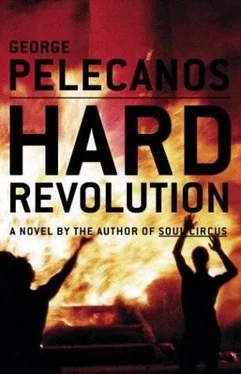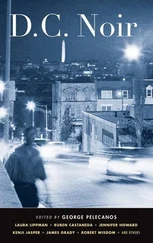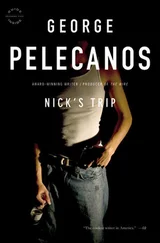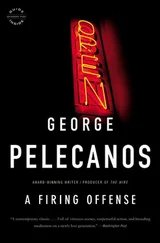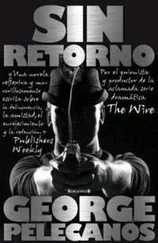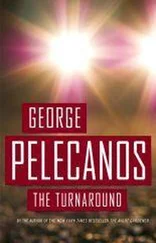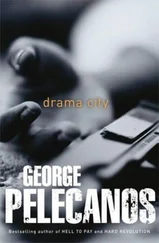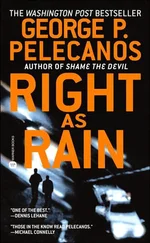As he ate his ice cream, he watched his father cross the street with the pie box in his hand. A group of white boys drove by in a dropped-down Chevy and yelled something at his father from the open windows of their car. His father returned, expressionless, and made no mention of the incident. But Derek had heard their laughter, and the sound had cut him deep.
The last stop on their route home was Tempchin’s Kosher Meat Market, a butcher shop between Shepherd and Randolph, down on 14th. In the store, Darius Strange said hello to Abe Tempchin, the proprietor, a thick, balding man who always seemed to have a smile on his face. To Derek, the place smelled funny, and the customers in here, white folks but not exactly, talked funny, too. Kinda like Billy’s father, Mike.
“The holy man come in today?” said Darius Strange.
“Yes, he was here,” said Tempchin.
“Let me get one of those chickens he got to, then.”
Derek knew that Tempchin kept a shack full of live chickens behind the store. His father had told him that the rabbi, “the Jew version of a minister,” would come to the store and kill the chickens, an odd thing, Derek thought, for a man of God to do. His father had explained, “That’s what makes ’em kosher,” and Derek had asked, “What’s kosher mean?” “I got no clue,” admitted his father. “But your mother thinks the chickens here are better than the ones at the A amp;P.”
They drove southeast into Petworth and Park View. Darius Strange parked the Mercury on Princeton Place, a street that graded up off Georgia. Row houses holding single and multiple families, mostly colored now, lined the block.
“Go on and get your mother some milk,” said Darius as he set the brake.
“Okay,” said Derek.
Derek went down the block to the east side of the Avenue. On one corner was the neighborhood movie house, the York, and on the other was a small grocery, one of many neighborhood markets scattered around the city. He picked up a bottle of milk and took it to the counter, where the owner, a Jew the kids called Mr. Meyer and the adults called just Meyer, sat on a high-backed stool. Mr. Meyer knew Derek and the other members of his family by name. He marked the purchase down on a yellow pad and thanked Derek for his business. Darius Strange settled his debt with Meyer on payday, or the first of the month, or sometimes whenever he could.
Derek came out of the market. A girl he knew was standing on the corner, wearing a store-bought dress. She was his age and his height, and she had breasts. She had dimples when she smiled. She was smiling now.
“Hi, Derek,” she said musically.
“Hey,” said Derek, stopping in his tracks. He had the milk bottle in one hand, but the other was free. That hand felt awkward hanging there, so he put it in the pocket of his blue jeans.
“Don’t you know my name?” the girl said. Lord, thought Derek, she has got some pretty brown eyes.
“Sure, I know it.”
“Why you don’t call me by it, then?”
“It’s Carmen.”
“ I know what it is. You don’t have to tell me it! You should be polite, though, and call me by my name when you see me.”
Derek felt his face grow hot. “Why you got a Puerto Rican name, girl?”
“It’s not Puerto Rican. My mama thought it sounded pretty, is all.”
“It’s all right,” said Derek.
Carmen Hill giggled and began to tap one foot on the sidewalk. She was wearing patent leather church shoes, must have had something on the tips of those soles for dancing, ’cause they made a sound.
“Why you laughin’?” said Derek. “I ain’t tell no joke.”
“That how you give a girl a compliment? My name is all right? ”
“It’s pretty,” said Derek quickly, and before he lost his nerve added, “Just like you.”
He turned and went up the street. He passed a German man, one of the last whites on the block, who had once thrown hot water at him and his brother for playing too close to his house, and a boy he recognized who was cradling a Daisy lever-action BB rifle he had gotten for his birthday. Ordinarily Derek Strange would have stopped and checked out the gun. But he kept going, looking over his shoulder at Carmen Hill, still standing there tapping her foot, smiling that smile, her eyes alive, those deep dimples of hers…
That girl bothered him nearly every time he saw her. Least he had had the nerve to tell her she was pretty. He wondered what her smart self thought of that.
At 760 Princeton, he took the steps up to his home.
THE FAMILY LIVED in a row house that Darius Strange had divided into two apartments. A single mother who worked at the cafeteria down at Howard University, not much more than a mile away, lived in the bottom unit with her three wild sons. Darius had bought the house after answering an ad in the Washington Post that read, “Colored, NW, Brick Home.” After putting three hundred and fifty down, he had secured a GI Bill loan at 4 percent. His nut was eighty-six dollars a month, and so far he had not missed a payment. The tenant downstairs was often late with her rent, but she was trying her best, and often he let her slide.
The Strange unit consisted of two bedrooms, a living room/ dining area, and a galley-style kitchen. The furniture and appliances were old but clean. A screened-in porch, where Derek Strange often slept on summer nights, gave onto a view of a small dirt-and-weed backyard and then an alley. The alley, and the grounds of Park View Elementary up the block, were the primary playgrounds for the boys and girls of Princeton Place and those on Otis Place, the next street to the south.
Derek Strange entered the apartment. His father had settled in his regular big old chair, the one facing the television set, a new twenty-one-inch Zenith with Space Command remote control. He had the latest Afro-American spread out in his lap. On the TV screen, James Stewart and Stephen McNally were firing rifles at one each other, both of them having found protection in an outcrop of rocks.
“Young D,” said Dennis Strange, eighteen, tall and lean like his father, dark skinned like the entire family. Dennis was seated at the table where the Stranges took their meals. He, too, had a copy of the Afro-American before him. There were always extras around the house.
“Dennis,” said Derek.
“What you been doin’, man?”
“Playin’.”
Dennis rubbed his fingers along the top of his shaven head. “With your white-boy friend?”
“So?” Derek stared at the gunplay on the TV screen. The sound of ricochet was loud in the room. “Why they tryin’ to kill each other, Pop?”
“One man took the other man’s Winchester in the beginning of the movie,” said Darius Strange. “They just gettin’ around to settlin’ it now.”
Derek looked at the tabloid-sized newspaper in his father’s lap. Derek and his best friend, Lydell Blue, delivered the Washington edition of the newspaper to neighborhood subscribers on Tuesdays and Fridays, earning roughly two dollars a week each. This was real money to them. Derek always tried to read the paper, too. Unlike the stuff he read in the Post and the Star, the stories in the Afro described his world.
Often, though, the stories scared him some. The front page of the latest issue talked about this boy Mack Parker, only twenty-one years old, who got beat half to death and dragged out of his cell by a lynch mob down in Mississippi. His mother was sayin’, “Oh, Lord, why?” ’cause no one had seen Parker since the mob threw him in a car outside the jail. Reminded Derek of the story of that boy Emmett Till, which Dennis was always goin’ on about, who got murdered down there for nothing more than whistling at a white girl.
Читать дальше
